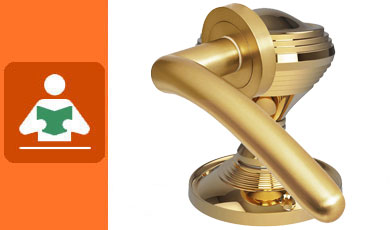Pros of Door Knobs
1.1. Timeless Aesthetics: Door knobs exude a classic and timeless charm that can complement various architectural styles. They are often associated with traditional or vintage designs, adding a touch of nostalgia to the overall aesthetic of a space.
1.2. Space-Saving: Door knobs are generally more compact than lever handles, making them an excellent choice for smaller spaces or rooms with limited clearance. This space-saving feature can be particularly beneficial in closets, pantries, or bathrooms.
1.3. Security: Door knobs can offer a level of security due to their design. They often feature a cylindrical shape that can be challenging for intruders to grip and turn. This design makes it more difficult for unauthorized access, enhancing the overall security of a home or building.
1.4. Versatility in Design: Door knobs are available in a wide range of designs, finishes, and materials. This versatility allows homeowners and designers to choose knobs that match the overall theme of the space, providing flexibility in design choices.
Cons of Door Knobs
2.1. Accessibility Challenges: One of the main drawbacks of door knobs is their lack of accessibility, especially for individuals with mobility issues or disabilities. Turning a door knob can be difficult for those with limited hand strength or dexterity, making lever handles a more practical option in such cases.
2.2. Limited Functionality: Door knobs may offer limited functionality, especially in situations where quick and easy access is crucial. Lever handles, with their more ergonomic design, allow for easier and faster opening of doors, making them a better choice for high-traffic areas.
2.3. Not Ideal for Heavy Doors: Door knobs may not be the best choice for heavy doors, as they can be challenging to operate when significant force is required. Lever handles, with their leveraged design, are better suited for heavy doors, providing a more ergonomic and user-friendly experience.
Lever Door Handles: Modern Ergonomics
Pros of Lever Door Handles
1.1. Accessibility and Ergonomics: Lever door handles are praised for their ergonomic design, offering easy and comfortable access for people of all ages and abilities. This makes them an excellent choice for both residential and commercial spaces, ensuring that everyone can navigate through doors effortlessly.
1.2. Ease of Use: Lever handles are incredibly easy to use, requiring a simple downward or upward push to open the door. This ease of use is especially advantageous in situations where quick access is essential, such as emergency exits or high-traffic areas.
1.3. Modern Aesthetics: Lever handles are often associated with modern and contemporary designs. They can add a sleek and sophisticated touch to any space, making them a popular choice for those looking to achieve a more updated and stylish interior.
1.4. Ideal for Heavy Doors: The levered design of door handles makes them well-suited for heavy doors. They provide better leverage, reducing the effort required to open or close such doors. This makes lever handles a practical choice for entrances or doors leading to outdoor spaces.
Cons of Lever Door Handles
2.1. Less Security: While lever handles are easy to use, their design may be considered less secure than door knobs. The lever's extended design may be easier for intruders to manipulate, potentially compromising security. However, advancements in lock technology have addressed some of these concerns.
2.2. Trend Sensitivity: Lever handles, being associated with modern designs, may be subject to trends. Choosing lever handles that align with current styles can enhance the overall aesthetic of a space, but it may also mean that the hardware could become outdated as design trends evolve.
2.3. Lack of Variety: Compared to door knobs, lever handles may offer less variety in terms of design options. While there are still numerous styles and finishes available, the market for lever handles may not be as diverse as that for door knobs.
Trends in door hardware Preferences
As we explore the pros and cons of door knobs and lever door handles, it's essential to consider the trends shaping contemporary preferences. In recent years, there has been a noticeable shift towards lever handles for several reasons.
- Aging Population: With an aging population, there is a growing emphasis on universal design principles that prioritize accessibility. Lever handles, being more user-friendly for individuals with limited hand strength or dexterity, align with these principles and are becoming increasingly popular in residential settings.
- Modern Architecture and Interior Design: The rise of modern and minimalist design trends has contributed to the popularity of lever handles. Architects and designers often opt for the sleek and streamlined appearance of lever handles to complement the clean lines and simplicity associated with contemporary design.
- Commercial Spaces: Lever handles are commonly found in commercial spaces due to their ease of use and compliance with accessibility regulations. This trend has influenced residential design preferences, as homeowners seek to replicate the functional and stylish aspects of commercial door hardware.
- Advancements in Security Technology: Security concerns have traditionally been in favour with door knobs, as lever handles were perceived to be less secure. However, advancements in lock technology have addressed these concerns, making lever handles a viable option without compromising on security.
Conclusion
The choice between door knobs and lever door handles is more than a matter of personal preference; it involves considerations of aesthetics, functionality, and accessibility. While door knobs carry a classic charm and offer security benefits, lever handles excel in accessibility and ease of use. The ongoing trend towards lever handles is driven by a combination of factors, including an aging population, modern design preferences, and advancements in security technology.
Ultimately, the decision between door knobs and lever handles should be based on the specific needs and preferences of the user, as well as the overall design goals of the space. As design trends continue to evolve, it is likely that door hardware manufacturers will respond with innovative solutions that combine the best features of both door knobs and lever handles, providing homeowners and designers with an even wider range of options to choose from.


